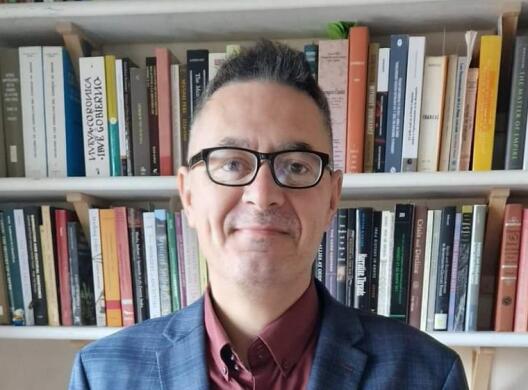

We are delighted to announce that the Centre for Empire Studies has appointed two new fellows who will join us in Münster starting on October 1.
During their six month stay, both fellows will pursue their individual research projects and take part in the intellectual life of our center and the wider community, for example in the colloquium on modern and contemporary history in the coming winter semester and in the planned workshop. We look forward to the perspectives and insights they will bring.
Mario Graña Taborelli graduated with a PhD in Latin American Studies from the University of London in 2022. His research is focused on political cultures of the Early Modern Iberian Worlds. He is particularly interested in the use of law as a site for politics, on border/frontier spaces, and on the construction of locality and its tensions with global identities.
His present research project is called "Building Political Density, 'Equipping' the Land: Entangled Jurisdictions, Political and Legal Cultures, and Locality in the Construction of the Southeast Frontier of Charcas in the late sixteenth to early seventeenth centuries". This project has been based in the University of London and University College London and will be grounded and nurtured -with support from colleages- at Munster University next.
Mario's main publications are:
Graña Taborelli, Mario. Jurisdictional Battlefields: Political Culture, Theatricality, and Spanish Expeditions in Charcas in the Second Half of the Sixteenth Century. Liverpool University Press, 2024.
Graña Taborelli, Mario. ‘To Keep the Land Populated. Localising Empire and Constructing Locality, in the Sixteenth-Century Charcas Frontier’. Itinerario, 14 January 2025, 1–15. https://doi.org/10.1017/S0165115324000354.
Graña Taborelli, Mario. ‘Speaking the Language of Friendship: Partnerships in the Political Construction of the Late Sixteenth‐Century South‐East Charcas Frontier’. Bulletin of Latin American Research 42, no. 5 (2023): 721–33. https://doi.org/10.1111/blar.13526.
Graña Taborelli, Mario. ‘Localizando y Recentrando La Visita. La Inspección de La Frontera de Tomina Por El Corregidor de Potosí y Teniente de Virrey, Don Pedro Osores de Ulloa En 1596’. Historia Agraria de América Latina 4, no. 02 (2023): 23–41. https://doi.org/10.53077/haal.v4i02.166.
Graña Taborelli, Mario. ‘Entre La Justicia y La Razón de Estado: Sede Vacante, Patronazgo y Frontera’. Boletín Del Instituto de Historia Argentina y Americana Dr. Emilio Ravignani, no. 63 (June 2025): 1–24. https://doi.org/10.34096/bol.rav.n63.14521.
Hayley C. Roy is a doctoral candidate in Modern European History at Emory University in Atlanta, Georgia, USA. Her research interests include the history of imperialism and colonialism, especially in the German context, and healthcare history, particularly the history of nursing. Her research has been supported by multiple grants and fellowships, including a research stay at the Free University of Berlin for the 2024-2025 academic year funded by the German-American Fulbright Commission. Roy’s doctoral project has received recognition and support through the Central European History Society, the American Association for the History of Nursing, the Cushwa Centre of the University of Notre Dame, and the Emory University Department of History. She has written and taught a multidisiplinary undergraduate course about the transnational history of nursing which has been well received by students in healthcare and the humanities alike.
Research Project: “Wild Sisters:” Volunteer Nurses in German Overseas Colonies (1884 – 1919)
Roy’s PhD dissertation focuses on women from Germany who traveled to German colonies in Africa and the Pacific in order to pursue nursing work at the turn of the twentieth century. Over the three decades of the study, nursing in the colonies transformed from a missionary-adjacent religious calling to a specialized occupational field primarily for unmarried women. Due in part to the relatively short tenure of German overseas colonialism, nursing theory and practice created through the colonial encounter reverberated into the metropole. The particular needs of the colonial healthcare landscape therefore set the course for nurse training as we recognize it at present. The project thereby elucidates the intersection of imperialism and healthcare.
While Roy’s current research focuses particularly on the German colonial context, her work is oriented towards a burgeoning transnational body of scholarship about imperialism, healthcare, and women nurses.

